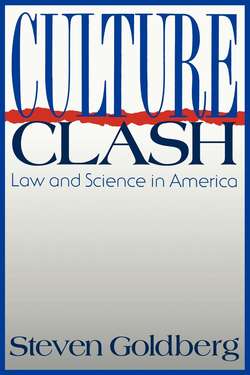Читать книгу Culture Clash - Steven Goldberg H. - Страница 18
На сайте Литреса книга снята с продажи.
The Enlightenment Background
ОглавлениеThis result is hardly surprising, given the background of the framers of the Constitution. Veneration of science was a central tenet of eighteenth-century Enlightenment thinking 2 for science was believed to illuminate not merely natural phenomena but political and theological matters as well.3 Isaac Newton was not simply revered; he was nearly deified. Alexander Pope’s tribute to Newton is illustrative: “Nature and Nature’s Laws laid hid in night; God said, Let Newton be! and all was light.”4 Leading Americans of the Revolutionary era shared this Enlightenment view.5 Science and public affairs were so closely related that any distinction between scientific and political leaders was difficult to maintain. David Rittenhouse and Benjamin Rush were important officeholders and political figures. Rittenhouse was a self-taught astronomer whose famous mechanical orrery demonstrated the motions of the heavenly bodies. Regarded by his fellow Americans as a scientist of the first rank, he was a member of Pennsylvania’s general assembly and of that state’s constitutional convention. He also provided scientific advice in the Revolutionary War, aided in defining U.S. weights and measures, and served as first director of the U.S. Mint.6 Rush was a physician who contributed to medical theory and chemistry. He inspired Thomas Paine to write Common Sense, attended the Continental Congress, and signed the Declaration of Independence.7
Both Rittenhouse and Rush were close friends of Thomas Jefferson, whose scientific interests are well known. Jefferson’s observations on natural history in Notes on the State of Virginia constitute his most extensive scientific work, but he commented as well on a variety of other fields, including paleontology and geography.8 James Madison was also intrigued with natural history,9 whereas Alexander Hamilton studied medicine, enjoyed mathematics, and urged friends to learn chemistry to improve their thinking.10 With Ben Franklin, the boundary between scientist and political leader dissolves altogether. One of the world’s leading physicists and America’s foremost ambassador, Franklin was, to many European philosophers, the Enlightenment incarnate.11
The science that so appealed to America’s founders, and that continues to be valued today, was an outgrowth of the revolutionary advances in astronomy and physics associated with Galileo and Newton. It was characterized by reliance on empirical data as opposed to sacred texts or royal pronouncements, and by an effort to use man’s knowledge of nature to improve the human condition.12 In the eighteenth century, when Newtonian principles were applied to virtually all human endeavors, the very word science referred to knowledge generally.13 Jefferson listed “the sciences which seem useful and practicable” as “Botany, Chemistry, Zoology, Anatomy, Surgery, Medicine, Nat’l Philosophy, Agriculture, Mathematics, Astronomy, Geology, Geography, Politics, Commerce, History, Ethics, Law, Arts, Fine arts.”14 Thus when the framers used the word science, they meant to include (among other things) what today would be referred to as basic research in the natural sciences.
Scholars have devoted considerable attention to the way in which infatuation with this type of science affected the building of political institutions. In opposing unicameral legislatures, for example, John Adams invoked “one of Sir Isaac Newton’s laws of motion, namely—‘that reaction must always be equal and contrary to action’ or there can never be any rest.”15 But the building of a clockwork constitution accounts for only half of the science-government relationship. The Constitution that resulted had an impact on the further development of science.
